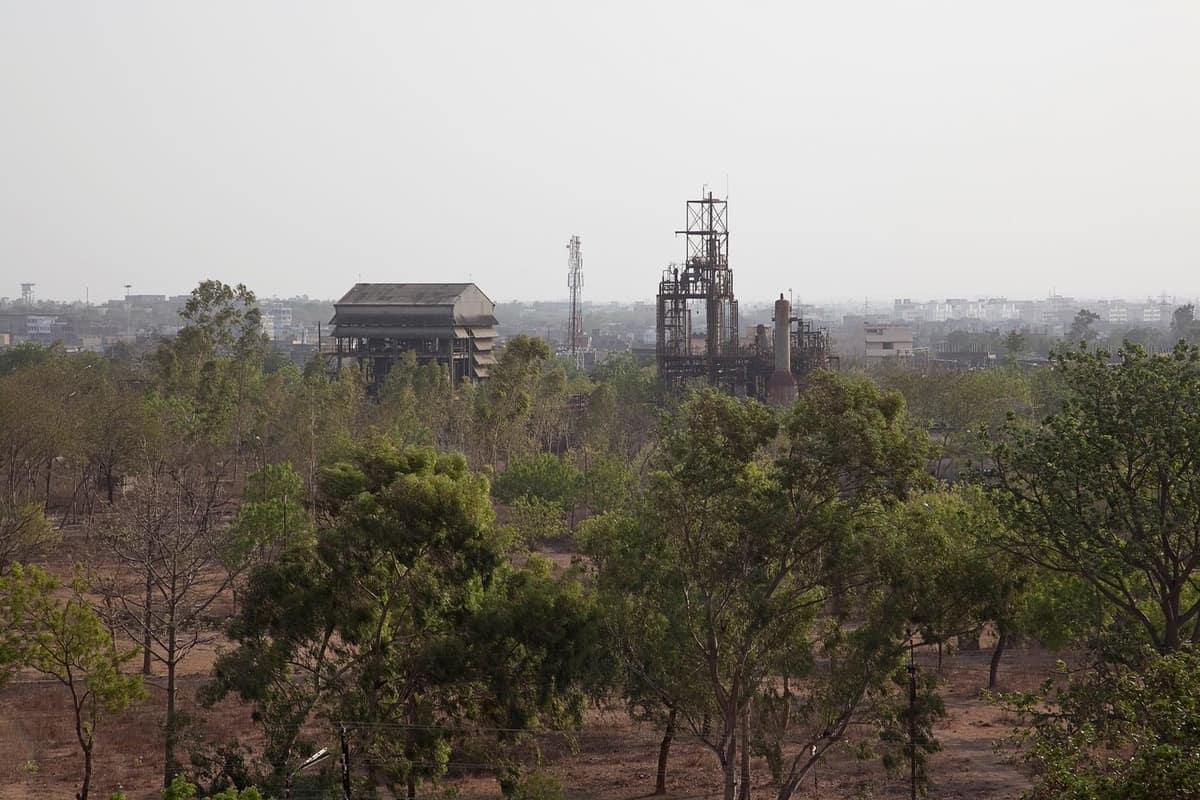Imagine having lost a loved one for the sake of a disposable polystyrene cup.
This is the position many families in the Indian town of Visakhapatnam, Andhra Pradesh, now find themselves in after a deadly toxic gas leak at a local plastics factory left 15 dead and hundreds injured on May 7th of this year. It has been more than two months since deadly styrene gas from the plant, owned by South Korean company LG Chem, overran five villages outside Visakhapatnam in the early hours of the morning, forcing more than a thousand local residents to flee their homes in an attempt to outrun the clouds of toxic vapour. During that time, an investigation into the cause of the accident has brought to light new information on how the leak occurred, including accusations that the plant was operating illegally for years and that the leak may have been due to negligence and a lack of adequate safety standards.
In the wake of the leak, South Korean company LG Chem, owners of Indian subsidiary LG Polymers that run the plant, issued a statement accepting responsibility for the disaster and offering to launch an investigation into the cause of the leak while co-operating with local authorities. The Andhra Pradesh state government announced they would be airlifting in 500 tons of a special chemical known as PTBC, produced in Gujarat, to neutralise the gas. They also offered compensation of RS. 1 crore (roughly £100,000) to the families of those that died, as well as varying lesser amounts to those in critical condition or in need of hospitalisation due to exposure.

The UN Responds
In a statement on May 8th, UN Secretary General Antonio Guterres offered his condolences to the victims and their families and called for a full-scale investigation into the accident by local authorities. An investigation by the Indian authorities into the cause of the accident was officially launched the same week, with the aim to establish whether the accident involved negligence or a breach of safety standards at the site.
On May 14th, UN Special Rapporteur on the implications for human rights of the environmentally sound management and disposal of hazardous substances and wastes, Buskat Tuncak, released a statement in which he welcomed the investigation, while comparing the disaster to the one that occurred in Bhopal in 1984:
I urge Indian and Korean authorities, and the businesses implicated, to avoid the same mistakes and abuse of judicial procedures that have denied justice to the victims of the Bhopal disaster, who are still suffering to this day – UN Special Rapporteur Buskat Tuncak
Tuncak urged that any investigation must not focus only upon short-term justice and reparations for the victims, but also on the long-term implications of the disaster for both the victims and the environment. ‘I am concerned about ensuring that the victims of exposure who develop disease or disabilities later in life are provided an effective remedy’, Tuncak continued, while again citing Bhopal as an instance in which victims continue to suffer, even three generations on, from the ongoing environmental impact of the 1984 disaster.
Offering his condolences to the victims, Tuncak said the Visakapatnam gas leak ‘also illustrates the range of human rights infringements brought about by our rampant consumption and production of plastics’. This was, he continued, ‘yet another preventable disaster within the chemical industry that has caused horrific suffering amongst innocent workers and local communities in India and is yet another reminder that around the the world, mini-Bhopal chemical disasters continue to unfold with shocking regularity.’ Tuncak finished his statement by calling once again for better regulation of the chemical industry and the threat it represents to human rights:
Yet this industry initiative’s principles contain no mention of human rights and fail to require that industry respects human rights in practice as required under the United Nations Guiding Principles on Business and Human Rights – UN Special Rapporteur Buskat Tuncak
Accusations of Illegal Operation and Negligence
Within days of the opening of the investigation, multiple Indian news sources reported that the plant may have been operating illegally for more than a decade, having failed to secure mandatory environmental clearance from the central Indian government for multiple expansions at the site. Since 2001, LG Polymers had undertaken expansion work at the plant on multiple occasions without the necessary legal paperwork, procuring only clearance from the local Andhra Pradesh pollution control board.
Despite concerns that local government might attempt to suppress any potential findings of the investigation in order to protect foreign business interests and investments in India, on July 8th, two months after the leak, it was reported by BBC Telegu and multiple Indian news outlets that the South Korean CEO of LG Polymers, along with 11 other employees, had been arrested and accused of causing death by negligence. The results of the official investigation cited negligence and a lack of safety standards at the plant, as well as a lack of enforcement of environmental safety protocols. In addition to the arrests, two engineers at the plant have now been suspended by the pollution control board of Andhra Pradesh for failing to adequately enforce protocols for environmental safety at the factory.
One Accident Every Two Days
Although the outcome of the investigation is a welcome one for those concerned with the impact of the chemical industry on both human rights and the environment, this accident was by no means an isolated incident. In total there have been more than 30 industrial accidents in India since the lockdown was lifted on May 30th, resulting in over 75 deaths. It remains an endemic problem in the country that has only worsened rather than improved in the 35 years since the Bhopal gas disaster.
It is yet another reminder that around the world, mini-Bhopal chemical disasters continue to unfold with shocking regularity – UN Special Rapporteur Buskat Tuncak
Although the response to the Visakapatnam leak is a step in the right direction for corporate accountability, until measures are taken to ensure stricter regulation of the chemical industry on a global scale, such disasters will continue to occur on a daily basis, with devastating consequences for both the environment and individuals around the world. While the issue is perhaps more prominent in developing nations such as India and Brazil, it is by no means limited to these nations. Lawyer Robert Bilott’s case against chemical giant DuPont for its dumping of toxic waste in the town of Parkersberg, West Virginia – as depicted in the 2019 film Dark Waters, starring Mark Ruffalo as Bilott – is just one example of corporate negligence in the Western world that has had a global impact, with traces of PFOA chemicals now found to be present in the blood of almost every living creature on earth.

The Need for Corporate Accountability
While we are pleased that in the case of the Visakapatnam leak legal action has been taken and that the victims have not been denied compensation or access to appropriate medical care, there is a desperate need for new standards of corporate accountability. In the more than three decades since the Bhopal disaster things have gone in entirely the wrong direction. There is, according to Tuncak, perhaps less corporate accountability today than at any other point in history.
The fact is that factories like these provide work to people in rural locations where jobs are otherwise hard to come by. They are a boost to the economy and represent foreign investment in India. As such it is not in the vested interests of the state authorities to punish those found to be operating outside the law: in doing so they are potentially depriving local people of jobs, shrinking the economy and alienating foreign investment in India. The system is setup in such a way that those responsible for policing the corporations have the most to lose by doing so. This conflict of interest won’t be resolved until we put the job of policing big business in the hands of people who don’t have a vested interest in the industry.
So long as business if not properly regulated, foreign corporations will continue to exploit cheap labour and a lack of enforcement of safety standards for profit, resulting in more deaths by negligence and continued pollution and destruction of the environment.This is a sad story, but not by any means a new one. Things will continue like this so long as we allow them to. It is now our duty to put pressure on those responsible, governments no less than the corporations themselves, to ensure these chemical companies operate within the bounds of the law and in a way that does not endanger the lives of workers and local people. So long as accidents of this kind continue to occur on a near daily basis, things will not truly change until big business is properly regulated and the rights of workers – to health, labour and a life with dignity – are finally upheld.
This is just one reason among many that the story of the Bhopal survivors should not, and cannot, continue to be ignored. The upcoming curative petition in the Indian Supreme court to overturn Union Carbide’s compensation settlement represents a landmark case in the history of corporate accountability, one that that will have far-reaching consequences for the global chemical industry. If the original decision is upheld, it will deny justice to the victims of the biggest industrial disaster in history, and send a clear message to the chemical industry that they can continue to endanger lives and pollute the environment with impunity.


